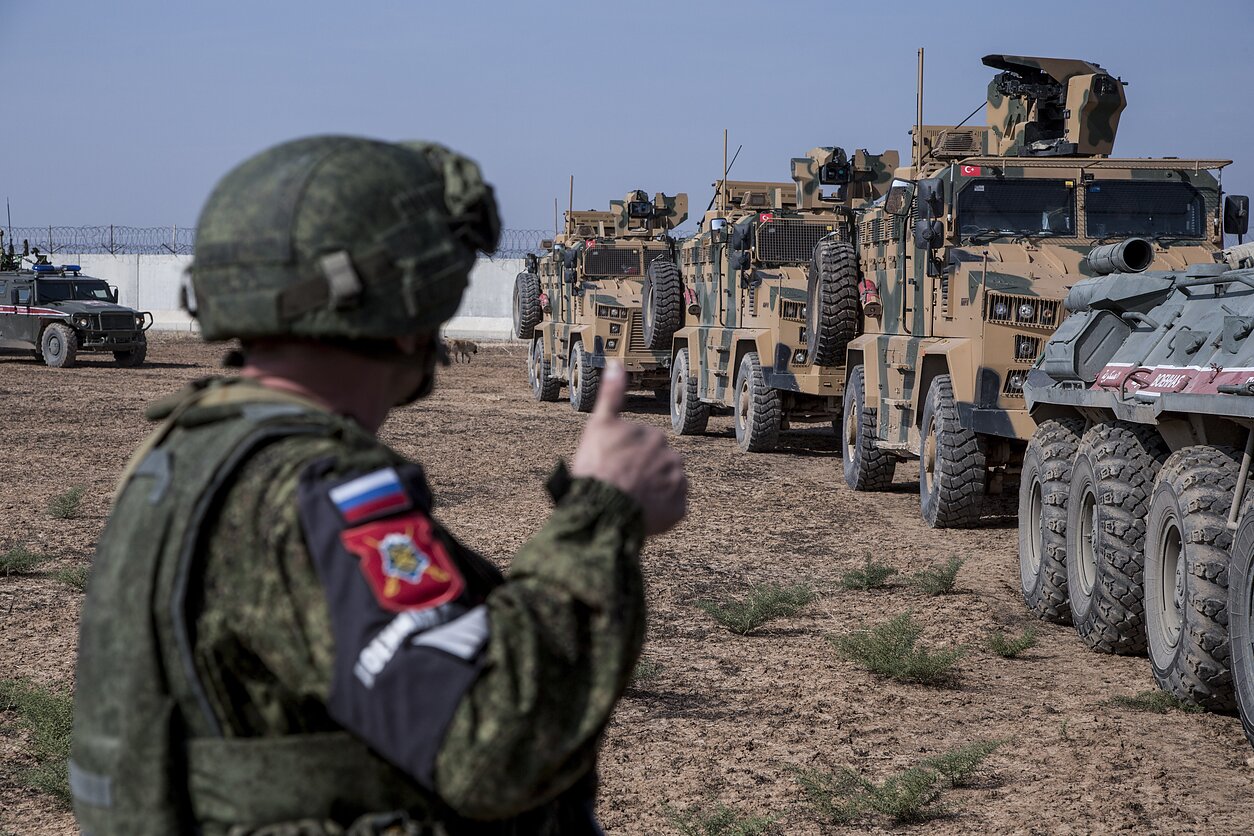Moscow and Ankara are pushing ahead with efforts to contain a conflict in northwestern Syria, which has displaced nearly one million people in the region, mainly women and children, since early December.
On Wednesday, the Russian Armed Forces and their Turkish counterparts conducted the third joint patrol along the M4 highway in Syria's Idlib province - an area controlled by opposition factions.
"The third joint Russian-Turkish patrol of M4 highway section in Idlib's de-escalation zone, which links the cities of Aleppo and Latakia, was conducted on April 8," Russia's TASS news agency reported, citing the Russian Center for Reconciliation of the warring parties in Syria.
One of the main terms of a ceasefire brokered by Turkey and Russia last month was the launch of joint patrols along the M4 highway linking Syria's East and West. The patrols began on March 15 in a bid to ease tensions in Syria's war-ravaged Idlib province and create a security corridor on both sides of the road.
As part of the patrol, Moscow sent two BTR-80 armored vehicles and an armored vehicle, dubbed Tiger, while Russian drones gained control of airspace to ensure the patrol's protection.
Turkey’s defense minister, Hulusi Akar, echoed the center's statement, and revealed in a Tweet that the joint patrol was carried out by air and ground vehicles on the M4 motorway.
"Regardless, caution is fundamental for us," Hurriyet Daily quoted Akar as saying on Wednesday. "It is our wish for the ceasefire to become permanent."
The Moscow ceasefire deal is of particular significance for Turkey as the country hosts around 3.6 million Syrian refugees, according to data provided by the United Nations Refugee Agency. If Idlib falls, Ankara could find itself having to host another 1.3 million refugees - a burden it may not be able to take on.
The ceasefire followed the Sochi deal announced by Turkish President Recep Tayyip Erdoğan and Russian President Vladimir Putin in September 2018. Russia and Turkey, along with Iran, are considered guarantors of the Astana peace process, which aims to end the Syrian conflict.
The war first broke out in 2011 when Syrian police responded to a series of large-scale protests in several Syrian cities, which called for the ousting of the country's President Bashar Al Assad. Protests and clashes quickly turned into a bloody conflict that has seen the interventions of foreign powers.
Tensions in the region escalated following a military offensive led by Erdogan in February against Syrian President Bashar Al Assad's regime. The move was a response to airstrikes on three dozen Turkish soldiers, which were carried out by Syrian forces with the aim of taking control of the northwestern Syria.
Idlib holds tremendous symbolic and strategic value for both Moscow and Damascus. Over the last nine years, the city has served as a safe haven for refugees displaced from other parts of Syria, and is now seen as the last stronghold for rebel and jihadist groups.
According to the London-based Syrian Observatory for Human Rights, an estimated 560,000 people have been killed in Syria due to the conflict, and more than half of the Syrian population has been displaced either internally, or throughout the world.







 The number of evacuees from flooded areas in Kazakhstan has reached 97,852 people, including about 32,856 children since March 27.
The number of evacuees from flooded areas in Kazakhstan has reached 97,852 people, including about 32,856 children since March 27.
 The Islamic holy month of fasting, Ramadan comes to an end this week with the celebration of a joyous festival called Eid (meaning “festival” in Ar...
The Islamic holy month of fasting, Ramadan comes to an end this week with the celebration of a joyous festival called Eid (meaning “festival” in Ar...
 Iran's senior military leaders described the drone and missile attack on Israel on April 14 night as “successful".
Iran's senior military leaders described the drone and missile attack on Israel on April 14 night as “successful".
 Iranian President Ebrahim Raisi warned Israel that it would face a "real and extensive" response if it makes any "mistake" following Tehran’s missi...
Iranian President Ebrahim Raisi warned Israel that it would face a "real and extensive" response if it makes any "mistake" following Tehran’s missi...



